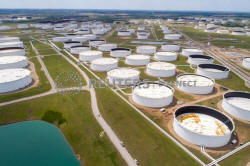Global oil markets under pressure as Asia destocks, China imports slowed
 Send a link to a friend
Send a link to a friend
[March 25, 2021] By
Florence Tan, Olga Yagova and Devika Krishna Kumar
(Reuters) - Crude oil producers from
Europe, Africa and the United States faced difficulties selling to Asia,
especially China, as buyers took cheaper oil from storage while refinery
maintenance has reduced demand, industry sources said on Thursday.
Chinese independent refiners, which account for a fifth of the country's
imports, have slowed imports in the second quarter because of refinery
maintenance, strong Brent prices and a large influx of supplies,
including Iranian oil, in first quarter.
These buyers and others in Asia are lapping up cheap oil offered by
traders under pressure to clear storage after Brent crude flipped into
backwardation, with prices for prompt delivery higher than those for
future months, traders said.
As a result traders were forced to sharply reduce prices for spot
cargoes loading in April and May from Europe, Africa and the United
States for delivery to Asia.
Lockdowns in Europe have also reduced demand, they said.
"Barrels are struggling to find homes in the export market as Asia still
isnít buying and Europe is struggling as well," said Scott Shelton,
energy specialist at United ICAP.
Crude grades priced on Brent were worst hit, traders said, as a wide
spread between the global benchmark and Middle East's Dubai crude price
made them least appealing to Asian buyers.
"China's demand for (Russian) Urals, West African, CPC Blend oil just
evaporated. Buying from stock is much more interesting for them now,"
said a source with a western trading house.
Caspian CPC Blend crude's discount to dated Brent widened to $2.85 per
barrel, the lowest since mid-May 2020 when the COVID-19 pandemic caused
oil demand to plunge, Refinitiv Eikon data showed.
CPC Blend is a popular grade with South Korean refiners, but this month
they also minimized oil purchases amid refinery maintenance and buying
from storage, two traders said.
[to top of second column] |

Crude oil storage tanks are seen in an aerial photograph at the
Cushing oil hub in Cushing, Oklahoma, U.S. April 21, 2020.
REUTERS/Drone Base
Unipec, the trading arm of Asia's largest refiner Sinopec, offered six of its 10
term Angolan crude cargoes in April to the market, traders said.
An April-loading cargo of Angolan Mostarda crude sold this month for $1.50 a
barrel below dated Brent, down over a dollar from levels seen in the previous
month, they said.
"There's just too much supply so buyers want to see cheap cargoes," a
Singapore-based trader said.
Graphic: Europe, Africa, U.S. crude prices under pressure from low Asia demand -
https://fingfx.thomsonreuters.com/
gfx/ce/xegvbgbzzpq/Pasted%20image%201616658114231.png
Reduced Asian buying also put pressure on U.S. Gulf Coast grades. WTI at East
Houston, a popular export grade, slumped to the weakest since October this week
as export activity for April has been muted.
U.S. crude arrivals in Asia are expected to drop to about 30 million barrels in
April, the lowest since June 2020, according to initial assessments from
Refinitiv Oil Research on Eikon.
However, the recent drop in Brent crude prices closer to $60 a barrel if
sustained, could help revive Asia's demand in late June or early July, traders
said.
By that time, Asia's peak maintenance season would have ended while inventories
would have largely been drawn down, they said.
(Reporting by Olga Yagova and Gleb Gorodyankin in MOSCOW, Florence Tan in
SINGAPORE, Noah Browning in LONDON and Devika Krishna Kumar in NEW YORK, writing
by Olga Yagova; Editing by Simon Cameron-Moore)
[© 2021 Thomson Reuters. All rights
reserved.] Copyright 2021 Reuters. All rights reserved. This material may not be published,
broadcast, rewritten or redistributed.
Thompson Reuters is solely responsible for this content. |